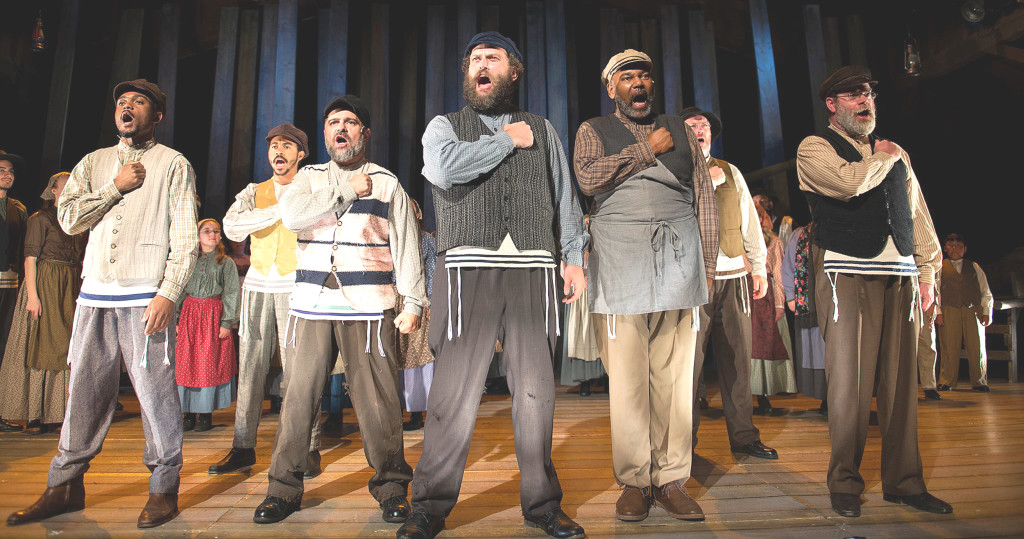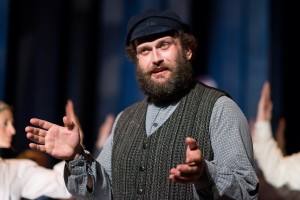
THE PAPAS take their place in “Tradition,” in “Fiddler on the Roof,” at the Berkeley Playhouse through Aug. 2.
Ben Krantz Studio photos
Some elements of the Playhouse production are unique and lend a surprising twist to the oft-staged musical. Matthew McCoy’s choreography is a sensational enhancement, especially in a round-style rendition of the earliest musical number, “Tradition.” Also, actors use mime to indicate what goes on in their characters’ lives as the play transitions forward in time between scenes. The most notable variation, though, is that the fiddler-on-the-roof in this production is Tevye’s own third daughter (Grace Ng as Chava).
For me, having that sensitive and tragic figure turn and leap gleefully down into her father’s arms steals from the cohesiveness of the tale. The mysterious fiddler is the metaphor for the situation the story describes, so it is quite a stretch to combine that with the part of the playful young girl. Anyone not already familiar with the story might spend some time trying to see a connection here, where none was ever intended.
Those particular aspects aside, there is so much to like about the production overall, it’s hard to know where to begin to describe its strengths.
Campbell captures the audience immediately with warmth, ease and genuine spirit, and Mitchell is his perfect counterpart as feisty, headstrong Golde. The two set a distinct tone for the household, and Abbey Lee rounds out the top tier of the family with a smart grace as eldest daughter Tzeitel.
One delightful aspect of the Playhouse production is the fact that everyone can sing — and that the sound comes to the audience almost flawlessly over a careful network of mics. Costumes are accurate and well-constructed, and sets and lighting are polished. Song and dance come together exceptionally well, for example in the memorable Cossack dance, complete with billowing black trousers and royal red tunics.

MICHAEL R.J. CAMPBELL is Tevye in “Fiddler on the Roof,” at the Berkeley Playhouse through August 2.
One element “Fiddler” aficionados might find lacking is the troupe’s conveyance of the tragedy of the underlying movement in the country to persecute and eventually dislocate the Jews; especially when soldiers disrupt a family wedding party, but also whenever the constable (Johnny Debernard) brings disheartening news to Tevye, the emotion feels underplayed.
The opposite can be said of the tender moments in the story, as when Tevye agrees to allow his daughters to marry for love, then ponders this deviation from long-standing tradition. He gets ecstatic embraces from the girls, and when he goes home and asks his wife, “Do You Love Me?” the couple sings passionately about the answer to that profound question.
“Fiddler on the Roof” is timeless because it illustrates the universal themes of family, strife and tradition, and does so within a short dramatic work written by a master storyteller — based on Shalom Aleichem’s stories, the book is written by Joseph Stein. The Playhouse production is delivered with fine attention to detail in every aspect, including excellent costuming and choreography and accomplished acting.
If you’ve never seen a stage production of “Fiddler on the Roof,” see this one. If you’ve seen “Fiddler” many times, see this one. A remarkable assemblage of talent has come together with a lot of heart, dedication and polish to produce a memorable theater experience.
If You Go
“Fiddler on the Roof” continues at the Julia Morgan Theatre, 2640 College Ave., Berkeley through Aug. 2. Tickets are $23 to $60 and are available by calling 510-845-8542 or online at berkeleyplayhouse.org.
Elizabeth Warnimont is a freelance writer specializing in the performing arts. She is also a substitute teacher for the Benicia Unified School District.






Leave a Reply